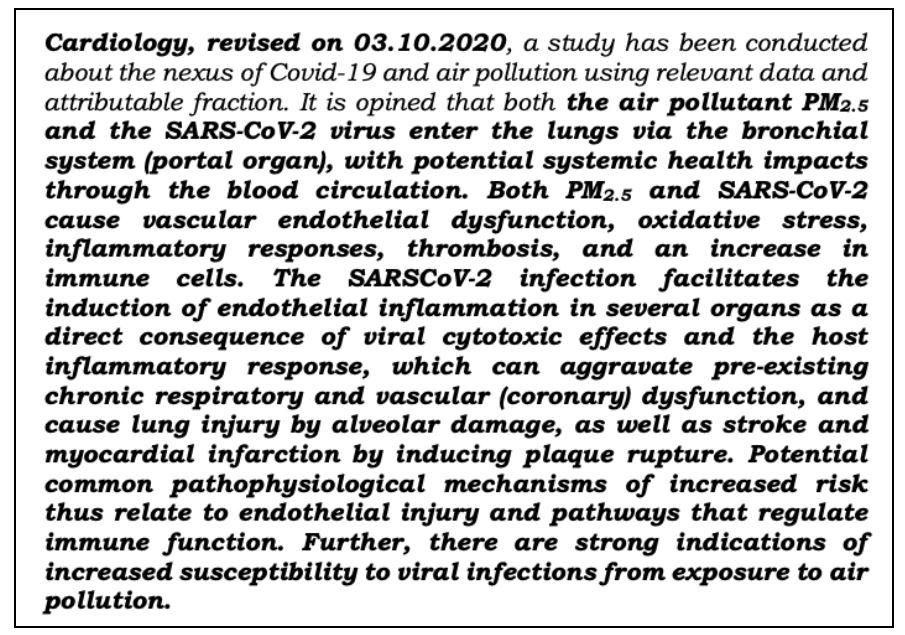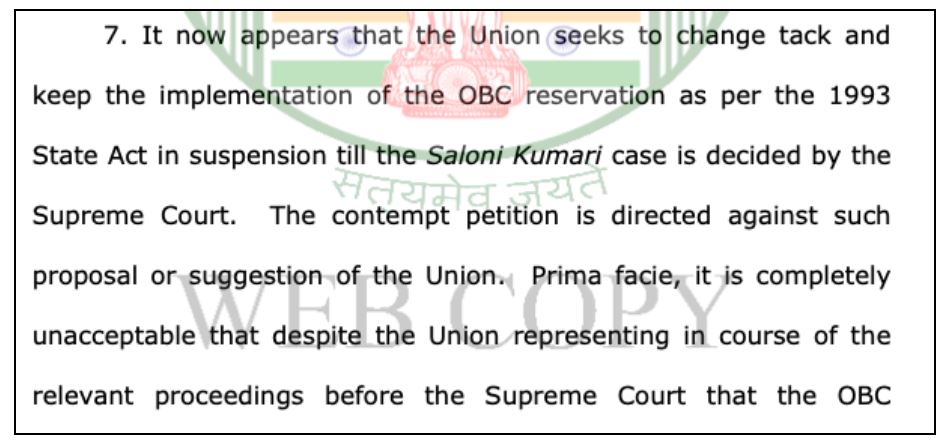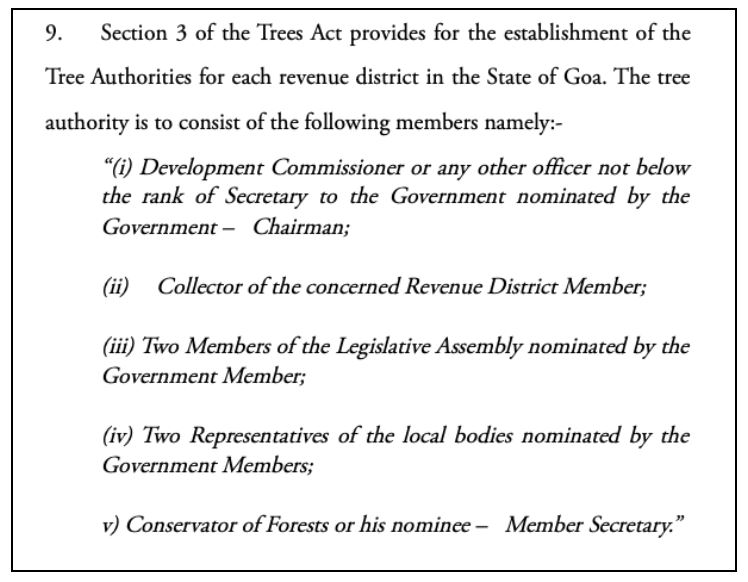In this roundup of court judgements, we look at Constitutional Courts’ remarks & directions about NGT’s ban on firecrackers in cities with poor air quality, non-implementation of OBC reservation in medical colleges for 2021-22, importance of public transport buses with disabled-friendly amenities, and proper functioning of Tree Authority in Goa.
Supreme Court: Upholds NGT Ban on Firecrackers in Delhi-NCR Region with ‘Poor’ Air Quality.
The supreme court upheld the National Green Tribunal’s (NGT) order imposing a complete ban on the sale and use of all firecrackers during the COVID-19 pandemic in the Delhi-NCR region and other cities in India wherein the Air Quality Index (AQI) was poor.
In December 2020, a Bench headed by NGT Chairperson Justice AK Goel imposed a total ban on the use of firecrackers. In cities/towns where air quality is ‘moderate’ or below, only green crackers could be used for a specified period for the celebration of any specified festivals. The apex court was hearing appeals challenging the NGT’s order.
Submissions made on behalf of an individual retailer contended that firecrackers did not figure in the top 15 reasons for pollution, and if the main issue was redressal of pollution, then all causal factors had to be considered such as stubble burning. He stated that the fireworks industry had received the short end of the stick and that the NGT order had rendered him without resources and making him lose his money.
The bench of Justices AM Khanwilkar and Sanjiv Khanna observed that nobody has a right to carry on business at the cost of the health of others. The bench dismissed the appeal and upheld the NGT’s total ban on the use and sale of firecrackers in the Delhi-NCR region.
The NGT order highlights COVID-19 deaths attributable to long-term air pollution exposure. ICMR studies have proved that long-term exposure to air pollution has been linked to an increased risk of fatality from COVID-19. It is further stated that there have been studies from Europe and the US, where they have looked at polluted areas and have compared mortality during lockdown and correlation with pollution. Scientists estimated that about 15% of deaths worldwide from COVID-19 could be attributed to long-term exposure to air pollution. In Europe the proportion was about 19%, in North America it was 17%, and in East Asia about 27%. The NGT order also referred to news reports by Mint and Newsclick that have highlighted that same.

The NGT also issued the following directions:
- With a view to ensure the availability of air quality data, at least one air quality monitoring station must be set up at every district headquarter at the earliest.
- The air quality data may be placed on the website of the District administration and also at prominent locations in the towns.
- The District Magistrates in every district may take steps to ensure that banned firecrackers are not sold.
- The District Magistrate, on a complaint or otherwise, will recover compensation from violators of the above directions.
- Any victim of pollution, apart from other remedies, can approach the District Magistrate for compensation, by showing evidence of individual damage and the person responsible for the damage. If no such claim is made for six months after the collection of the compensation, the amount credited to the ‘District Environment Compensation Fund’ can be spent for restoration of the Environment in the District.
Madras HC: Centre’s attempts at not implementing OBC reservation in medical colleges for 2021-22 constitutes prima facie contempt.
The Madras high court has directed the Central government to take immediate measures for implementing OBC reservation in MBBS seats under All India Quota, across under-graduate and post-graduate medical and dental colleges of the State.
The matter pertains to the high court’s order (dated 27 July 2020) to Central Government regarding framing laws to provide reservation to the ‘Other Backward Classes’, ‘Scheduled Castes’ and ‘Scheduled Tribes’ in the State surrendered seats in the all-India quota for medical seats in Tamil Nadu. The high court was then hearing a batch of pleas filed by several petitioners, including various political parties in Tamil Nadu as well as the Tamil Nadu Government.
The Court had thereby directed the Central Government to form a committee to provide the terms of implementation of such reservation for courses to be run from the next academic year onwards. It stated that such a committee must ensure participation from the Central Government, the State Government, the Medical Council of India, and the Dental Council of India. The Court also directed the Central Government to specify the percentage of such reservation for OBCs preferably within three months from the date of order.
The considered stand of the Union of India was that steps were being taken to implement the OBC reservation to ‘All India Quota’ seats in the State from the academic year 2021-22. However, the high court observed that the Union government seeks to change tack and keep the implementation of the OBC reservation as per the 1993 State Act in suspension till the ‘Saloni Kumari’ case is pending before the Supreme Court is decided.

The high court held that Centre’s apparent attempts at deferring such implementation of OBC reservation is in abject violation of its earlier order thereby constituting prima facie contempt of Court. Accordingly, the Court directed the Centre to indicate the mode and manner of implementation of the OBC reservation in respect of All India Quota seats for the academic year 2021-2022 within 7 days of the order.
Madras HC: Restrains State Govt from purchasing Public Transport Buses without Disabled Friendly Amenities
The Madras high court passed an order restraining the State government from purchasing any new buses for the purpose of public transport unless such buses are disabled-friendly as per the statutory requirements under the Rights of Persons with Disabilities Act, 2016 and the Rights of Persons with Disabilities Rules, 2017.
The petitioner highlighted the 2017 Rules along with a notification issued by the Government of India in 2016 which stipulates that the provision of the relevant Rule would be implemented in two phases: In the first phase, certain parameters as to technical specifications would apply to all buses on or after 1 January 2017, and in the second phase, the provisions of the revised specifications would apply on or after 1 January 2018.
Additionally, the high court observed that writ petitions pertaining to better facilities for persons with disabilities had been pending from the year 2007 or even 2005, and nothing fruitful or worthwhile has been done to address the genuine grievances or day-to-day problems faced by them.
On behalf of the State, it was submitted that there are certain practical difficulties, particularly in finding resources not only to acquire the more expensive buses but also to create the road infrastructure to be able to host such sophisticated buses.
While the high court accepted that the state needs time to indicate a roadmap, the court also maintained that it is necessary that the state be restrained from acquiring any further bus for the public transport system which does not conform to the specifications indicated in the notification of 2016. The matter is posted for further hearing on 19 August 2021.
Bombay HC: Issues Directions for the proper functioning of Tree Authority in Goa.
The Bombay high court at Goa issued several directions for the proper functioning of Tree Authorities in the North and South districts of Goa and discharge the duties, which include conducting a census of existing trees, planting and transplanting of trees, etc.
The Tree authorities were constituted under the Goa, Daman and Diu Preservation of Trees Act, 1984. The high court was hearing a petition filed by NGO Living Heritage Foundation, which pointed out that Tree Authorities for the two districts of North and South Goa are defunct from the date of the enactment of the Trees Act (1984), or, from November 2012, the date on which the two Tree Authorities came to be constituted.

The high court expressed distress on the non-functioning of Tree Authorities in both the districts of Goa and issued a slew of directions, some of them include:
- The Tree Authorities are directed to meet at least once in every three months as mandated by Section 4(1) of the Trees Act and to discharge the duties for which they are responsible in terms of Section 7 and other provisions of the Trees Act.
- The Tree Authorities are directed to meet and consider the co-option of up to three representatives of Non-Official Organisations having special knowledge or practical experience in the preservation of trees in terms of Section 3(3) of the Trees Act. Such meeting to be held within two months and compliance report together with the decision as reflected in the minutes to be placed before the court.
- The Tree Authorities, consistent with the provisions of Section 7(b) of the Trees Act, are directed to carry out a census of the existing trees and obtaining, whenever considered necessary, declarations from all the owners or occupants about the number of trees in their lands.
- The Tree Authorities, consistent with the provisions of Section 7(e) of the Trees Act must take appropriate measures for planting and transplanting of trees necessitated by the construction of buildings, new roads, or widening of existing roads, etc. A status report in this regard is to be filed by the Member Secretaries in this Court on or before 31 December 2021.
- The Tree Authorities, consistent with the provisions of Section 7(i) of the Trees Act to undertake a critical study of the proposals of various Government Departments and private bodies for construction of buildings, roads, factories, irrigation works, laying out of electric, telephone, telegraphic and other transmission lines with regard to the protection of existing trees and planting of more trees, wherever possible. A status report in this regard is to be filed by the Member Secretaries in this Court on or before 31 December 2021.
- The Tree Authorities are directed to comply with the obligations cast upon them by Section 4 of the Right to Information Act, 2005 and to upload the information prescribed in the said Section on the website of the Forest Department.
- The State Government is directed to constitute the “Tree Protection Fund” as mandated by Section 35-A of the Trees Act within a maximum period of six months from the date of judgement.
Featured Image: Important court judgements


